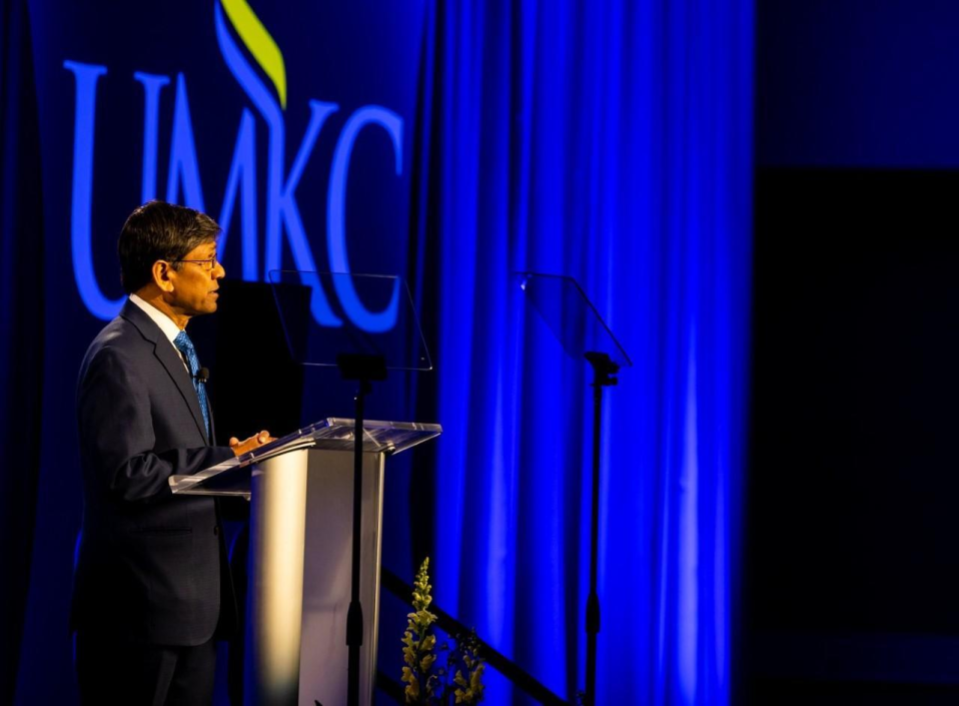UMKC Chancellor C. Mauli Agrawal held his State of the University address last Thursday to discuss the university’s accomplishments during the past year and the school’s vision moving forward.
However, the address was not without pushback.
That same morning, members of the Graduates United of the University of Missouri-Kansas City stood outside the Student Union holding up signs that critiqued graduate worker compensation. One sign read, “Hello, Mom. I’m living in poverty.”
“I don’t trust the administration to present what the actual state of the university is,” said Ely Fair, a graduate teaching assistant (GTA) who organized the rally. “It’s our job to advocate and amplify our experience.”
During his address, Agrawal did not directly address longstanding graduate worker demands to be paid minimum wage. He did, however, discuss plans to put aside $1 million in support of M.F.A. and Ph.D. candidate stipends, and he promised to put another million aside to address salary compression for faculty and staff.
Agrawal also made commitments to undergraduates who show significant financial need.
“For all Pell-eligible students, UMKC will commit to bridging the financial gap,” Agrawal said. “[This] will allow these students to attend UMKC for free.”
Additionally, Agrawal said administration is moving the Roo Pantry from its location on Troost to the first floor of the Student Union to make the resource more accessible. Due to an endowment from Agrawal and his wife, the university will be naming the new location after Agrawal’s mother.
While Agrawal mentioned that the Roo Pantry will begin to provide services that also address housing needs, the chancellor did not address the students affected by the Oak Street Hall flooding.
“There was just no real acknowledgment of it,” said a source who wished to remain anonymous and whose room was flooded over winter break. “I don’t think it was addressed properly.”
Agrawal did, however, spend some time discussing recent efforts to improve the experiences of other groups:
- First-generation students: Agrawal spoke about plans to expand First Gen Roos, a program that provides mentorship for first-generation college freshmen.
- Students of color: Agrawal mentioned “new visible expressions” of UMKC’s commitments to students of color. These expressions include banners currently hanging from the Student Union and the creation of the Divine Nine Gardens, a series of gardens that represent the nine Black Greek organizations on campus.
- International students: UMKC currently has around 1,600 international students, said Agrawal, which is the most in the history of the university and 36% higher than last year.
- Research faculty: Through the Center for Advancing Faculty Excellence (CAFE), Agrawal said UMKC has been working to nominate faculty for national awards. The university will be hiring a faculty fellow to expand this effort. Agrawal also made a commitment to set aside $150,000 each year for “internal micro-grants exclusively for those faculty in the areas of the humanities, arts, performing arts and social sciences.”
- Surrounding communities: To address health inequalities in Kansas City, UMKC launched the Health Equity Institute, said Agrawal. This means “partnering with Jackson County, local churches and businesses to bring better, more equitable health care to our east side communities.”
The Chancellor ended his speech by recognizing faculty and staff who went above and beyond during the pandemic. He praised a custodian named Solomon Eshete, an office support assistant named Sandy Martin and Dr. Teresa Huff-Pomstra, a staff psychologist and outreach coordinator.
“When I came here, I told you that I saw us as a family,” Agrawal said. “That sentiment is stronger today because we can see what we accomplished in challenging times.”
Meanwhile, the same sentiment has been criticized by graduate workers who feel they have not been properly taken care of by the university.
“At UMKC there’s generally this corporate-speak that we’re all one family,” said Fair, “while at the same time continuing a very long trend of treating workers on campus as some kind of dangerous contingency.”
A complete recording of the chancellor’s State of the University address is available here.
htbn87@umsystem.edu








